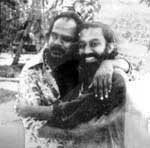|
|
|

History of
Malayalam Cinema -
IV |
|
The Legendary 1970's
It was the 70s, which witnessed
the blossoming of the Malayalam parallel cinema movement in
Kerala. Adoor Gopalakrishnan made his first film Swayamvaram in
1972, which paved the path for Malayalam cinema to the world
cinema arena. G.Aravindan through his Uttarayanam in 1974
accelerated this radical change in Malayalam cinema.
The parallel cinema movement had a positive effect on the
commercial cinema also. At a certain stage the line, which
separated these two sections of Malayalam cinema, became so thin
that a new branch evolved in Malayalam cinema industry, the
middle way cinema.
Nirmalyam (Yesterday's offering)
M.T.Vasudevan Nair directed his
first film Nirmalyam (1973), based on his own story. Nirmalyam
explored new possibilities in popular cinema. It narrates the
story of a temple "Valichappadu" (Oracle- the "valichappadu" is
supposed to be the personification of God. He speaks on behalf
of God to the gathering) and his family, passing through extreme
poverty. Nirmalyam won the National Film award for the best film
and P.J.Antony won the award for best actor.
Bharathan and Padmarajan

In the 80s Malayalam cinema
witnessed a new trend in filmmaking. Led by directors Bharathan
and Padmarajan, cinema took a path equidistant from traditional
"popular" and "parallel" cinema. These films avoided the usual
trashes used by commercial cinema industry and had artistic
value. These films were popular among the mass too.
Bharathan started his career with Prayanam. Rathinirvedam
(1978), Aaravam (1978), Thakara (1979), Marmaram (1982),
Oormakkai (1982), Kathodu kathoram (1985) and Vaishali are his
major works.
Padmarajan's first film to come out was Peruvazhi ambalam
(1979), which was based on his own novel. His other major works
includes Kallan pavithran (1981), Koodevede (1983), Thingalazha
nalla divasam (1985), Arapatta kettia gramathil (1985), Namukku
paarkan munthirithoppukal (1986) and his last film Njan
Gandharvan.
Hit makers
I.V.Sashi entered the film
industry by directing a small budget film with Ummer as the
lead, Ulsavam (1975) which was a commercial success. He
continued this success formula in most of his later films.
Angadi (1980), Ee nadu, Meen, Trishna (1981), Ragam, Anubandham
(1985), Vartha and Avanazhi (1986) are some of the mentionable
films in Malayalam cinema, money wise. He still continues his
success formula of heavy star cast, large canvas and heated-up
dialogues.
Fazil is known as the most money spinning directors of present
day Malayalam film industry. He started his career with the film
Manjil virinja pookal which introduced Mohan Lal who later
became a super star of Malayalam. Ente Mamatikuttiammakku,
Nokatha doorathu kannum nattu, Pappayude swantham Appus,
Aniathipravu and Harikrishnans are some of his money spinning
films.
Balachandra Menon, who entered Malayalam cinema in the 70s is
miraculously surviving even in 2002, and even won a National
Film award for best actor. Menon makes his films almost single
handedly, looking after directing, editing, writing, music
direction and so on. Tharatu, Kelkatha shabdam, Karyam nisaram
and Samantharangal are some of his major films.
Directors, Joshi and Thampi Kananthanam took Malayalam action
cinema to the "hi-tech" age. Joshi's New Delhi, Sandharbham,
Nair Sab and Pathram are some of the all time hits of Malayalam.
Thampi Kananthanam's Rajavinte Makan was a trend setting action
film.
Priyadarshan, Sibi Malayil, Kamal, Satyan Anthikkadu and Shaji
Kailas are some of the most influential directors of present day
Malayalam commercial cinema.
Srinivasan who entered to cinema industry as an actor later
proved his talent in writing screenplays and also direction. The
two films he directed, Vadakkunoki yantram and Chintavistayaya
Shyamala can be undoubtedly considered among the best commercial
cinemas ever produced in Malayalam. These films made in-depth
study of middle class family relationships and also human
psychology.
|
|
 |
 |
| |